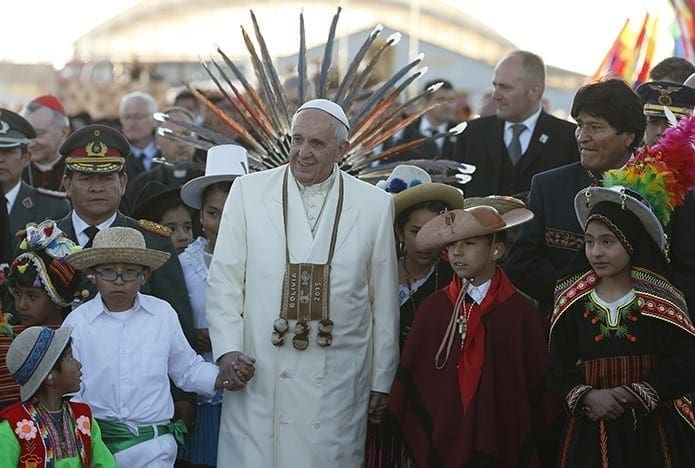 CNS photo/Paul Haring
CNS photo/Paul Haring Bolivia
Eucharist is a call to mission, to feeding the poor, pope says
By CINDY WOODEN, Catholic News Service | Published August 6, 2015
SANTA CRUZ, Bolivia (CNS)—The Eucharist is a missionary sacrament; it calls people to give all they are and have to God, seek his blessing and then take his love to the world, Pope Francis said at the opening Mass for Bolivia’s national Eucharistic congress.
Obeying Jesus’ command to “do this in memory of me,” he said, “demands exchange, encounter and a genuine solidarity.”
“It demands the logic of love,” the pope said July 9 at the Mass in Santa Cruz’ central Christ the Redeemer Square.
People from Bolivia and from throughout South America flocked to the city for the Mass, setting up a tent city July 8 on the four main roads converging in the square. The government set up jumbo screens along the roads for those unable to get close to the papal altar, even though they had camped out.
“We have come from a variety of places, areas and villages, to celebrate the living presence of God among us,” the pope told them.
In his homily, Pope Francis said that when life gets difficult, people can forget how much God has done for them and their hope can fade. When that happens, the pope said, the temptation is to “think only of ourselves” and close our hearts to the needs of others, especially the poor.
‘No one needs to go away’
Referring to the Gospel story of the multiplication of the loaves and fishes, Pope Francis pointed out that the disciples did not think it would be possible to feed so many people, and they thought Jesus should send the crowd away.
Like the disciples, he said, “faced with so many kinds of hunger in our world, we can say to ourselves: ‘Things don’t add up; we will never manage, there is nothing to be done.’”
But Jesus said to the disciples and says to all his followers today, “You give them something to eat.”
“Those words of Jesus have a particular resonance for us today,” the pope said. “No one needs to go away, no one has to be discarded; you yourselves, give them something to eat. Jesus speaks these words to us, here in this square.”
Jesus takes the little bread and fish available, the pope said, “he blesses them and then gives them to his disciples to share with the crowd. This is how the miracle takes place. It is not magic or sorcery.”
Jesus’ starting point is not the little bit of food at hand, the pope said. Rather, it is the people before him and their needs. Jesus takes what is available, and he offers it to God for a blessing, a sign that “he knows that everything is God’s gift.”
A blessing, he explained, is both an act of thanksgiving and of transformation: “It is a recognition that life is always a gift which, when placed in the hands of God, starts to multiply. Our Father never abandons us; he makes everything multiply.”
The Eucharist is the supreme act of blessing—of thanksgiving and transformation, Pope Francis said. It is “a sacrament of communion, which draws us out of our individualism in order to live together as disciples. It gives us the certainty that all that we have, all that we are, if it is taken, blessed and given, can, by God’s power, by the power of his love, become bread of life for all.”